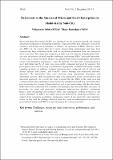| dc.contributor.author | Drbie, Mekonnen | |
| dc.contributor.author | Kassahun, Tilaye | |
| dc.coverage.spatial | Ethiopia | en |
| dc.date.accessioned | 2016-02-02T09:06:36Z | |
| dc.date.available | 2016-02-02T09:06:36Z | |
| dc.date.issued | 2013-12 | |
| dc.identifier.citation | Drbie, M. and Kassahun, T. (2013) Deterrents to the success of micro and small enterprises in Akaki-Kality sub-city, Journal of Business and Administrative Studies (JBAS), vol.5, no. 2, pp. 1-33. Addis Ababa: SMU Printing Press. | en |
| dc.identifier.issn | 2077-3420 | |
| dc.identifier.uri | https://opendocs.ids.ac.uk/opendocs/handle/20.500.12413/8836 | |
| dc.description.abstract | Micro and Small Enterprises (MSEs) are driving forces for economic growth, job creation and poverty reduction in developing countries. Cognizant of this fact, Ethiopia is one of the countries which have taken measures to enhance the operation of MSEs. However, there are MSE’s in the country that have shown deteriorating performance and have been experiencing huge stumbling blocks with no significant graduation from one enterprise level to the next. This study was conducted in some selected districts of Akaki-Kality Subcity with the purpose of analyzing the challenges confronting MSEs’ successful operation. To this end, a mixed research design was applied that involved quantitative (descriptive survey) and qualitative (exploratory research) methods. For this study, 89 questionnaires were distributed and 81 of them were successfully completed and used for analysis. The participants were selected using a combination of purposive, stratified and simple random sampling methods. In addition, in-depth interviews were conducted with 12 sub-city and district officials and experts; and 9 MSE’s owners through semi-structured interview questions. The quantitative data were analyzed using appropriate descriptive and inferential statistics while the qualitative data were analyzed by using content analysis and narration approach. As a result, the study revealed that the MSEs in the study area had created considerable employment opportunities for unemployed youth and contributed their part in boosting the incomes of households as well as personal savings. On the other hand, MSEs have been confronted with a number of challenges that obstructed their successes. In particular, the study had pinpointed inadequate infrastructure facilities, inadequate finance, poor managerial and technical skills, and inadequate working premises as the major challenges of MSE’s successful operations followed by marketing problems, low support from respective institutions, inadequate supply of raw materials, and regulatory issues. In line with the findings obtained from this study recommendations to respective governmental bodies and MSE’s owners/managers have been forwarded. | en |
| dc.language.iso | en | en |
| dc.publisher | St. Mary's University, Ethiopia. | en |
| dc.rights.uri | http://creativecommons.org/licenses/by-nc-nd/4.0/ | en |
| dc.subject | Development Policy | en |
| dc.subject | Economic Development | en |
| dc.subject | Rights | en |
| dc.title | Deterrents to the success of micro and small enterprises in Akaki-Kality sub-city | en |
| dc.type | Article | en |
| dc.rights.holder | St. Mary's University, Ethiopia | en |


